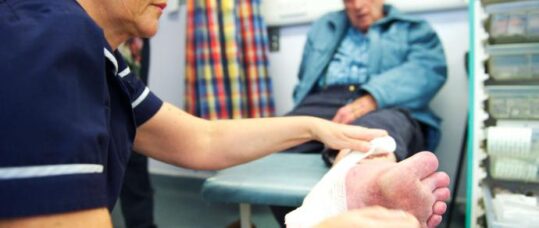Core capabilities for GPNs working at advanced level out for consultation

A new draft framework of core capabilities for advanced clinical practice, aimed at practice nurses working in general practice in England, has been published by Skills for Health.
The framework details a series of 13 capabilities that are expected of advanced nurse practitioners (ANP) working in general practice and using the ‘advanced’ title.
The core capabilities, which must be evidenced and maintained by the nurse, include critically engaging in research activity as well as networking with academic and clinical researchers.
ANPs must also consistently identify and act appropriately on red flags, appropriately manage and escalate medical emergencies such as sepsis, and manage medical complexity.
The capabilities are split into four domains: person-centered collaborative working (domain A); assessment, investigations and diagnosis (domain B); condition management, treatment and prevention (domain C); and leadership and management, education and research (domain D).
The core capabilities are required for both ANPs and practice nurses who see patients with undifferentiated and undiagnosed conditions. They are:
Related Article: QICN bids farewell to Dr Crystal Oldman as she retires from CEO role
-
Communication and consultation skills
-
Practicising holistically
-
Working with colleagues and in teams
-
Maintaining and ethical approach and fitness to practice
-
Information gathering and interpretation
-
Clinical examination and procedural skills
-
Making a diagnosis
-
Clinical management
-
Managing medical and clinical complexity
-
Independent prescribing and pharmacotherapy
-
Leadership, management and organisation
Related Article: RCN to offer ‘safe space’ to discuss Supreme Court ‘sex’ ruling
-
Education and development
-
Research and evidence based practice
All nurses working at an advanced level or using the ‘advanced’ title will need to demonstrate these capabilities.
The Academy for Advancing Practice, which is under development, will provide an opportunity to evidence capability to work at an advanced level.
But the academy will not evidence the nurse’s ability to work within the specific setting or role – this will be down to local and regional employers and governance.
Examples of evidence that a portfolio should contain include records of modules completed at university and workplace assessments, a learning log and patient satisfaction questionnaires.
ANPs must have undertaked or be working towards a minimum of a postgraduate diploma (PG Dip) in advanced clinical practice or equivalent. They will also be an independent prescriber.
Related Article: ‘Concerning acceleration’ in drug-resistant gonorrhoea ahead of vaccine programme
The draft framework has been published as part of the GPN 10-point plan, and builds on the multi-professional advanced clinical practice framework published by HEE in 2017.
It is now available online and open to feedback through a survey.
On the need for a framework, Skills for Health said in the report: ‘The advanced nurse practitioner role, within general practice, has developed without a set standard and this has led to varying levels of attainment, resulting in much disparity. This has created confusion for employers, fellow healthcare staff and patients because of variation in titles, qualifications and competency.’

See how our symptom tool can help you make better sense of patient presentations
Click here to search a symptom


A new draft framework of core capabilities for advanced clinical practice, aimed at practice nurses working in general practice in England, has been published by Skills for Health.



